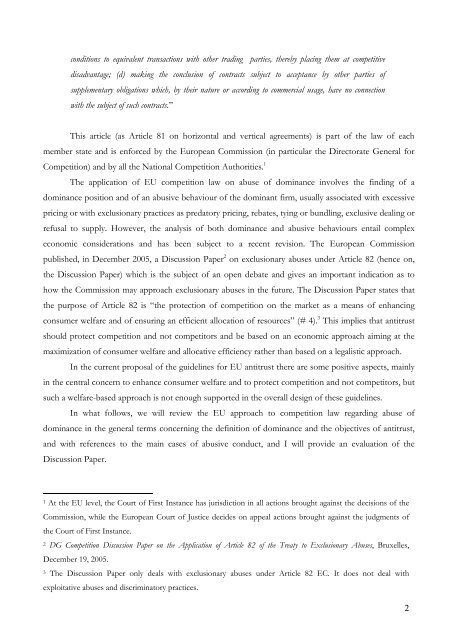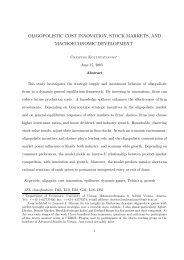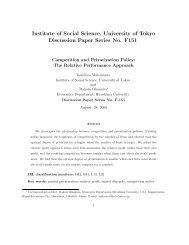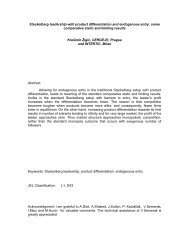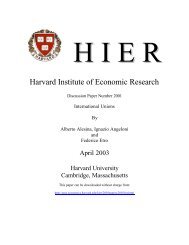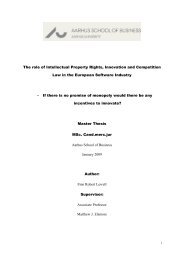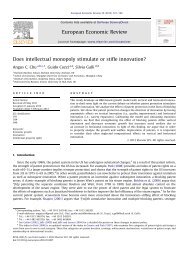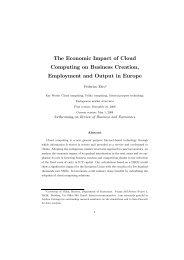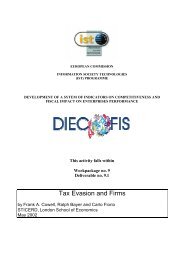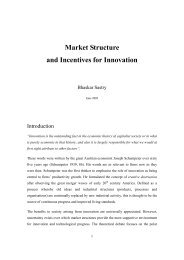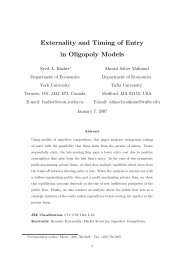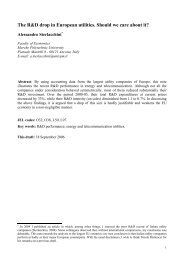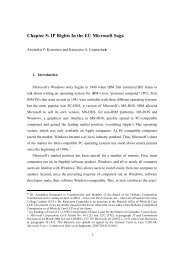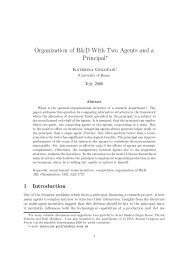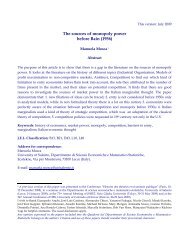The EU Approach to Abuse of Dominance - Intertic
The EU Approach to Abuse of Dominance - Intertic
The EU Approach to Abuse of Dominance - Intertic
You also want an ePaper? Increase the reach of your titles
YUMPU automatically turns print PDFs into web optimized ePapers that Google loves.
conditions <strong>to</strong> equivalent transactions with other trading parties, thereby placing them at competitive<br />
disadvantage; (d) making the conclusion <strong>of</strong> contracts subject <strong>to</strong> acceptance by other parties <strong>of</strong><br />
supplementary obligations which, by their nature or according <strong>to</strong> commercial usage, have no connection<br />
with the subject <strong>of</strong> such contracts.”<br />
This article (as Article 81 on horizontal and vertical agreements) is part <strong>of</strong> the law <strong>of</strong> each<br />
member state and is enforced by the European Commission (in particular the Direc<strong>to</strong>rate General for<br />
Competition) and by all the National Competition Authorities. 1<br />
<strong>The</strong> application <strong>of</strong> <strong>EU</strong> competition law on abuse <strong>of</strong> dominance involves the finding <strong>of</strong> a<br />
dominance position and <strong>of</strong> an abusive behaviour <strong>of</strong> the dominant firm, usually associated with excessive<br />
pricing or with exclusionary practices as preda<strong>to</strong>ry pricing, rebates, tying or bundling, exclusive dealing or<br />
refusal <strong>to</strong> supply. However, the analysis <strong>of</strong> both dominance and abusive behaviours entail complex<br />
economic considerations and has been subject <strong>to</strong> a recent revision. <strong>The</strong> European Commission<br />
published, in December 2005, a Discussion Paper 2 on exclusionary abuses under Article 82 (hence on,<br />
the Discussion Paper) which is the subject <strong>of</strong> an open debate and gives an important indication as <strong>to</strong><br />
how the Commission may approach exclusionary abuses in the future. <strong>The</strong> Discussion Paper states that<br />
the purpose <strong>of</strong> Article 82 is “the protection <strong>of</strong> competition on the market as a means <strong>of</strong> enhancing<br />
consumer welfare and <strong>of</strong> ensuring an efficient allocation <strong>of</strong> resources” (# 4). 3 This implies that antitrust<br />
should protect competition and not competi<strong>to</strong>rs and be based on an economic approach aiming at the<br />
maximization <strong>of</strong> consumer welfare and allocative efficiency rather than based on a legalistic approach.<br />
In the current proposal <strong>of</strong> the guidelines for <strong>EU</strong> antitrust there are some positive aspects, mainly<br />
in the central concern <strong>to</strong> enhance consumer welfare and <strong>to</strong> protect competition and not competi<strong>to</strong>rs, but<br />
such a welfare-based approach is not enough supported in the overall design <strong>of</strong> these guidelines.<br />
In what follows, we will review the <strong>EU</strong> approach <strong>to</strong> competition law regarding abuse <strong>of</strong><br />
dominance in the general terms concerning the definition <strong>of</strong> dominance and the objectives <strong>of</strong> antitrust,<br />
and with references <strong>to</strong> the main cases <strong>of</strong> abusive conduct, and I will provide an evaluation <strong>of</strong> the<br />
Discussion Paper.<br />
1 At the <strong>EU</strong> level, the Court <strong>of</strong> First Instance has jurisdiction in all actions brought against the decisions <strong>of</strong> the<br />
Commission, while the European Court <strong>of</strong> Justice decides on appeal actions brought against the judgments <strong>of</strong><br />
the Court <strong>of</strong> First Instance.<br />
2 DG Competition Discussion Paper on the Application <strong>of</strong> Article 82 <strong>of</strong> the Treaty <strong>to</strong> Exclusionary <strong>Abuse</strong>s, Bruxelles,<br />
December 19, 2005.<br />
3 <strong>The</strong> Discussion Paper only deals with exclusionary abuses under Article 82 EC. It does not deal with<br />
exploitative abuses and discrimina<strong>to</strong>ry practices.<br />
2


